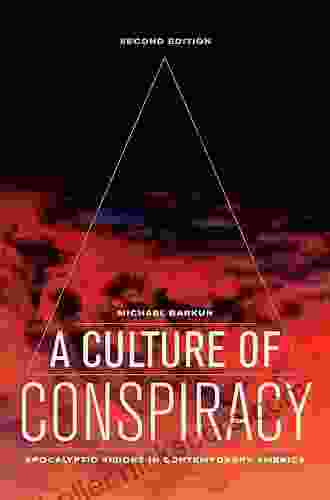Unveiling the Culture of Conspiracy Theories: Delving into the Intriguing World of Belief and Doubt

The allure of conspiracy theories has been an integral part of human history, persisting across civilizations and evolving in tandem with societal advancements. From ancient myths to modern-day online forums, the desire to ascribe hidden motivations and patterns to major events has captured the imagination of countless individuals. This article embarks on a comprehensive exploration of the culture of conspiracy theories, analyzing their origins, psychological underpinnings, impact on society, and the challenges in addressing their spread.
The Origins and Evolution of Conspiracy Theories
The roots of conspiracy theories can be traced back to ancient times, where people often resorted to supernatural explanations for unexplainable phenomena. Tales of divine interventions, hidden agendas, and secret societies have been woven into the fabric of human history. With the advent of modern science and technology, conspiracy theories began to adopt more rationalistic forms, often invoking scientific advancements or political machinations to support their claims.
4.5 out of 5
| Language | : | English |
| File size | : | 994 KB |
| Text-to-Speech | : | Enabled |
| Screen Reader | : | Supported |
| Enhanced typesetting | : | Enabled |
| Word Wise | : | Enabled |
| Print length | : | 321 pages |
| Lending | : | Enabled |
The widespread availability of information through the internet and social media in recent decades has significantly contributed to the proliferation of conspiracy theories. The internet's anonymous and decentralized nature allows for the unchecked dissemination of both factual and fabricated information, often blurring the lines between credible sources and dubious claims.
Psychological Factors Behind Belief in Conspiracies
Belief in conspiracy theories is often driven by a combination of psychological factors, including:
- Epistemic Curiosity: The desire to understand the world and make sense of complex events can lead individuals to seek alternative explanations that provide a sense of certainty and control.
- Cognitive Biases: Confirmation bias, the tendency to seek information that confirms one's existing beliefs, can contribute to the selective acceptance of evidence that supports conspiracy theories.
- Psychological Needs: Conspiracy beliefs can fulfill fundamental psychological needs, such as the need for belonging, control, and purpose.
Impact of Conspiracy Theories on Society
Conspiracy theories have a profound impact on society, both at individual and collective levels:
- Public Trust: Belief in conspiracy theories can undermine public trust in institutions, authorities, and experts.
- Polarization: Conspiracy theories often divide society into opposing factions, contributing to political polarization and social fragmentation.
- Erosion of Critical Thinking: Uncritical acceptance of conspiracy theories can weaken critical thinking skills and impair individuals' ability to evaluate information objectively.
Challenges in Countering Conspiracy Theories
Addressing the spread of conspiracy theories presents several challenges:
- Confirmation Bias: People who hold conspiracy beliefs are often resistant to evidence that contradicts their views, reinforcing their biases.
- Emotional Appeal: Conspiracy theories often tap into strong emotions, making them difficult to counter with rational arguments alone.
- Lack of Information Literacy: Inadequate information literacy skills can make it challenging for individuals to distinguish between credible and misleading information.
Strategies for Combating Conspiracy Theories
Countering the spread of conspiracy theories requires a multi-pronged approach:
- Education: Promoting critical thinking, information literacy, and media literacy in schools and communities can help equip individuals with the skills to evaluate information critically.
- Media Literacy Campaigns: Public awareness campaigns that focus on identifying and debunking common conspiracy theories can help raise awareness about the dangers of misinformation.
- Dialogue and Engagement: Engaging with individuals who hold conspiracy beliefs in respectful and open dialogue can provide an opportunity to challenge their assumptions and foster understanding.
- Regulation: Social media platforms and governments have a responsibility to regulate the spread of misleading information while protecting freedom of speech.
The culture of conspiracy theories is a complex phenomenon that has shaped human history and continues to impact our societies today. While the desire for certainty and control is understandable, uncritically accepting conspiracy theories can have detrimental consequences. By understanding the psychological factors that drive belief in conspiracies, their societal impact, and the challenges in countering them, we can develop effective strategies to promote critical thinking, foster dialogue, and mitigate the negative effects of misinformation.
Remember, in the pursuit of truth, skepticism and critical evaluation are key. It is by questioning assumptions, seeking evidence, and engaging in open-minded discourse that we can navigate the intricate web of conspiracy theories and emerge with a clearer understanding of the world we inhabit.
4.5 out of 5
| Language | : | English |
| File size | : | 994 KB |
| Text-to-Speech | : | Enabled |
| Screen Reader | : | Supported |
| Enhanced typesetting | : | Enabled |
| Word Wise | : | Enabled |
| Print length | : | 321 pages |
| Lending | : | Enabled |
Do you want to contribute by writing guest posts on this blog?
Please contact us and send us a resume of previous articles that you have written.
 Fiction
Fiction Non Fiction
Non Fiction Romance
Romance Mystery
Mystery Thriller
Thriller SciFi
SciFi Fantasy
Fantasy Horror
Horror Biography
Biography Selfhelp
Selfhelp Business
Business History
History Classics
Classics Poetry
Poetry Childrens
Childrens Young Adult
Young Adult Educational
Educational Cooking
Cooking Travel
Travel Lifestyle
Lifestyle Spirituality
Spirituality Health
Health Fitness
Fitness Technology
Technology Science
Science Arts
Arts Crafts
Crafts DIY
DIY Gardening
Gardening Petcare
Petcare Stephen Hawking
Stephen Hawking Vicki Franz
Vicki Franz Mike Eastman
Mike Eastman Howtodressage
Howtodressage Jean Nayar
Jean Nayar Matt Schifferle
Matt Schifferle Shannon Warden
Shannon Warden John A Fortunato
John A Fortunato Jason Brick
Jason Brick George Olsen
George Olsen Esther Hicks
Esther Hicks Rob Collins
Rob Collins Eduardo Montano
Eduardo Montano Jaime Flowers
Jaime Flowers Larry A Yff
Larry A Yff Lucy Hopping
Lucy Hopping E G Richards
E G Richards Pastor Ahyh
Pastor Ahyh David Barrie
David Barrie J R Harris
J R Harris Megan Davidson
Megan Davidson Sonja Schwartzbach
Sonja Schwartzbach Steve Oakes
Steve Oakes James Zug
James Zug Vincent W Davis
Vincent W Davis Kazumi Tabata
Kazumi Tabata Christy Teglo
Christy Teglo Richard Bass
Richard Bass Hiram Bingham
Hiram Bingham J C Cervantes
J C Cervantes David Hoffman
David Hoffman Cassandra Overby
Cassandra Overby Ned Mcintosh
Ned Mcintosh Sujit Sivasundaram
Sujit Sivasundaram Deepak Chopra
Deepak Chopra Jonathan H Turner
Jonathan H Turner Dusan Petkovic
Dusan Petkovic Jeannie Burlowski
Jeannie Burlowski Meg Cabot
Meg Cabot Miguel Crespo
Miguel Crespo John Major Jenkins
John Major Jenkins Phil Williams
Phil Williams Joanna Philbin
Joanna Philbin Ernle Bradford
Ernle Bradford Kate Mcmillan
Kate Mcmillan Leslie Valiant
Leslie Valiant Smart Edition
Smart Edition Mark William
Mark William Jp Lepeley
Jp Lepeley Doug Peacock
Doug Peacock Joyce Harper
Joyce Harper Michael Barkun
Michael Barkun Rosalyn Sheehy
Rosalyn Sheehy Scott Zimmerman
Scott Zimmerman Sandy Jones
Sandy Jones Martin Wells
Martin Wells Brett Stewart
Brett Stewart Eric C Lindstrom
Eric C Lindstrom John D Couch
John D Couch Varg Freeborn
Varg Freeborn Scott Hawthorn
Scott Hawthorn Jackie Freeman
Jackie Freeman Rob Coppolillo
Rob Coppolillo Cecelia Ahern
Cecelia Ahern Henry Worsley
Henry Worsley Santari Green
Santari Green George Case
George Case Guy P Harrison
Guy P Harrison Rob Vollman
Rob Vollman Brienne Murk
Brienne Murk Diana J Mason
Diana J Mason Marc Bona
Marc Bona Colleen Doyle Bryant
Colleen Doyle Bryant Grace Friedman
Grace Friedman Florence Weiser
Florence Weiser Marc J Reilly
Marc J Reilly Ethan Bezos
Ethan Bezos Karen Ward Mahar
Karen Ward Mahar Kaylene Yoder
Kaylene Yoder Karen E Mcconnell
Karen E Mcconnell Frederick L Coolidge
Frederick L Coolidge Matt Parker
Matt Parker Dan Jones
Dan Jones Michael Omi
Michael Omi Alex Horne
Alex Horne Kicki Hansard
Kicki Hansard Harry Vardon
Harry Vardon Nicholas Bjorn
Nicholas Bjorn Mark Powell
Mark Powell James A Whittaker
James A Whittaker Thomas Malory
Thomas Malory Danny Staple
Danny Staple Maria Sharapova
Maria Sharapova Robert Wright
Robert Wright Patti Henry
Patti Henry Rory D Nelson
Rory D Nelson Matthew Desmond
Matthew Desmond Elizabeth Dupart
Elizabeth Dupart Cal Pater
Cal Pater Elizabeth Davis
Elizabeth Davis Nadim Saad
Nadim Saad Mohammad F Anwar
Mohammad F Anwar Paul Carus
Paul Carus Jim White
Jim White Harry Bauld
Harry Bauld Patrick Garbin
Patrick Garbin Richard Kasper
Richard Kasper Brian Herne
Brian Herne Karl F Kuhn
Karl F Kuhn Zigzag English
Zigzag English Bruce A Fenderson
Bruce A Fenderson Eric Michael
Eric Michael Gustav Meyrink
Gustav Meyrink Sriman Sharma
Sriman Sharma Dr Faith G Harper
Dr Faith G Harper Laurie A Watkins
Laurie A Watkins Phillip Stephen Schulz
Phillip Stephen Schulz Emil Frlez
Emil Frlez Jacqueline Houtman
Jacqueline Houtman Iwan Rhys Morus
Iwan Rhys Morus John Connelly
John Connelly Kara Forney
Kara Forney Cheryl Diamond
Cheryl Diamond Murray Shukyn
Murray Shukyn Janice L Raymond
Janice L Raymond Jez Cajiao
Jez Cajiao Nate Allen
Nate Allen Maurice Herzog
Maurice Herzog Inge Bell
Inge Bell Peter Wacht
Peter Wacht David Schoem
David Schoem O S Hawkins
O S Hawkins Nachole Johnson
Nachole Johnson James D Tabor
James D Tabor Megan Kelley Hall
Megan Kelley Hall James M Jones
James M Jones Luis Preto
Luis Preto Ian Tuhovsky
Ian Tuhovsky Dr Nanhee Byrnes
Dr Nanhee Byrnes James Floyd Kelly
James Floyd Kelly Mick Conefrey
Mick Conefrey Marco Polo
Marco Polo Mary Morrison
Mary Morrison Heyward Coleman
Heyward Coleman Caitlyn Dare
Caitlyn Dare Paula Span
Paula Span Loyd Ellis
Loyd Ellis Joe Grant
Joe Grant Penny Alexander
Penny Alexander Sara Gaviria
Sara Gaviria P A Johnson
P A Johnson Steve Williams
Steve Williams Salima Ikram
Salima Ikram Fritjof Capra
Fritjof Capra Calvin Trillin
Calvin Trillin William Souder
William Souder Matt Morton
Matt Morton Tyler Hamilton
Tyler Hamilton Laura A Jana
Laura A Jana Michael Sean Comerford
Michael Sean Comerford Inger Mewburn
Inger Mewburn Jodi Aman
Jodi Aman David Jason
David Jason Nibedit Dey
Nibedit Dey Natalia Ilyin
Natalia Ilyin Phyllis Books
Phyllis Books Jeremy Bradstreet
Jeremy Bradstreet Kathleen Bartholomew
Kathleen Bartholomew Jonathan Grix
Jonathan Grix William Trubridge
William Trubridge Khalid Khashoggi
Khalid Khashoggi Richard Hingley
Richard Hingley Jimmie Holland
Jimmie Holland Daniel Bergner
Daniel Bergner Mary Heffernan
Mary Heffernan Clyde Soles
Clyde Soles Adrienne Onofri
Adrienne Onofri David Levithan
David Levithan Lucia Guglielminetti
Lucia Guglielminetti Paul Simpson
Paul Simpson Susan F Paterno
Susan F Paterno Samantha Michaels
Samantha Michaels Terence Tao
Terence Tao Tim Falconer
Tim Falconer J F James
J F James Estelle Dautry
Estelle Dautry Ivan Savov
Ivan Savov Brian W Kernighan
Brian W Kernighan John Mclachlan
John Mclachlan Janae M Robinson
Janae M Robinson Brion Toss
Brion Toss Matt Doeden
Matt Doeden Mark Seemann
Mark Seemann Bobbi Conner
Bobbi Conner Keith Foskett
Keith Foskett Jessica Minahan
Jessica Minahan Pat Manocchia
Pat Manocchia Carol Kaesuk Yoon
Carol Kaesuk Yoon Don Brown
Don Brown Bonnie Henderson
Bonnie Henderson Rick J Scavetta
Rick J Scavetta Jemar Tisby
Jemar Tisby Steven Trustrum
Steven Trustrum Rich Osthoff
Rich Osthoff Soong Chan Rah
Soong Chan Rah Jhenah Telyndru
Jhenah Telyndru Nicholas Gallo
Nicholas Gallo 1st Ed 2018 Edition Kindle Edition
1st Ed 2018 Edition Kindle Edition John Jeffries Martin
John Jeffries Martin Sara Elliott Price
Sara Elliott Price Joan Nathan
Joan Nathan Wilborn Hampton
Wilborn Hampton Daniel Dell Uomo
Daniel Dell Uomo Brian R King
Brian R King Megan Smolenyak
Megan Smolenyak Gerald R Allen
Gerald R Allen Chase Hassen
Chase Hassen Shayla Black
Shayla Black Gerson S Sher
Gerson S Sher Colleen Craig
Colleen Craig Joyce Bas
Joyce Bas Luis Angel Echeverria
Luis Angel Echeverria Michael Masters
Michael Masters Mitt Romney
Mitt Romney Sue Wieger
Sue Wieger Samuel Greenberg
Samuel Greenberg Judith A Owens
Judith A Owens Samuel Arbesman
Samuel Arbesman Karen Wilkinson
Karen Wilkinson Steve Bromley
Steve Bromley Mark Johnston
Mark Johnston Kelle James
Kelle James Brett Cohen
Brett Cohen Heather Rose
Heather Rose David Cannon
David Cannon Warren Hansen
Warren Hansen Steven Cross
Steven Cross J Wayne Fears
J Wayne Fears Ursula Hackett
Ursula Hackett David Hatcher Childress
David Hatcher Childress Rich Cohen
Rich Cohen D Levesque
D Levesque Denise Long
Denise Long Paul Weamer
Paul Weamer Guido W Imbens
Guido W Imbens Jonti Marks
Jonti Marks Tom M Apostol
Tom M Apostol Grete Waitz
Grete Waitz Dr Monique Thompson Dha Lpc
Dr Monique Thompson Dha Lpc Ron Lieber
Ron Lieber Caitlin Flanagan
Caitlin Flanagan Christopher Clarey
Christopher Clarey Toni Weschler
Toni Weschler Jennifer Block
Jennifer Block Kevin Alexander
Kevin Alexander Pedro Sarmiento De Gamboa
Pedro Sarmiento De Gamboa Loan Le
Loan Le Dave Cutcher
Dave Cutcher Kevin Marx
Kevin Marx Timothy A Sisemore
Timothy A Sisemore Chuanwei Li
Chuanwei Li Nora Roberts
Nora Roberts Jacques Vallee
Jacques Vallee Ksenia K
Ksenia K Dan Washburn
Dan Washburn Patty Wipfler
Patty Wipfler Sean Michael Wilson
Sean Michael Wilson Cecilia Twinch
Cecilia Twinch Dave Ramsey
Dave Ramsey Lily Raff Mccaulou
Lily Raff Mccaulou Dava Sobel
Dava Sobel Lucinda Scala Quinn
Lucinda Scala Quinn Steven W Vannoy
Steven W Vannoy Grace Mccready
Grace Mccready Lori Lyons
Lori Lyons Brogan Steele
Brogan Steele Kathleen Cushman
Kathleen Cushman Harold Gatty
Harold Gatty John Wesson
John Wesson Emily Lauren Dick
Emily Lauren Dick Robert Ullman
Robert Ullman Garrett Redfield
Garrett Redfield Judy H Wright
Judy H Wright Keith Ammann
Keith Ammann Steven Emanuel
Steven Emanuel J R Mathews
J R Mathews Nancy Boyd Franklin
Nancy Boyd Franklin Nicholas S Howe
Nicholas S Howe Kathleen Taylor
Kathleen Taylor Victor A Bloomfield
Victor A Bloomfield Gene Kritsky
Gene Kritsky Douglas R Hofstadter
Douglas R Hofstadter Brian Gewirtz
Brian Gewirtz Ted Franklin Belue
Ted Franklin Belue Jay H Lefkowitch
Jay H Lefkowitch Lee Alan Dugatkin
Lee Alan Dugatkin Scott Reed
Scott Reed Mitchel P Roth
Mitchel P Roth Brian Everitt
Brian Everitt Thao Te
Thao Te T J Tomasi
T J Tomasi Helen Zee
Helen Zee Joseph Burbridge
Joseph Burbridge Juliet Miller
Juliet Miller Gabriel F Federico
Gabriel F Federico F R Lifestyle
F R Lifestyle Elsevier
Elsevier Piero Ferrucci
Piero Ferrucci Bret Stetka
Bret Stetka Melissa Trevathan
Melissa Trevathan Avery Faigenbaum
Avery Faigenbaum David Murray
David Murray Steven Verrier
Steven Verrier Daniel Bagur
Daniel Bagur Jason Sandy
Jason Sandy D S Malik
D S Malik Arthur Scott Bailey
Arthur Scott Bailey Linda Carter
Linda Carter Bruce Macdonald
Bruce Macdonald Jeannette De Wyze
Jeannette De Wyze Richard Post
Richard Post Nehemia Gordon
Nehemia Gordon Paula Brackston
Paula Brackston Michel Odent
Michel Odent John Mcenroe
John Mcenroe Lukas M Verburgt
Lukas M Verburgt Keith Ryan Cartwright
Keith Ryan Cartwright David Hackett Fischer
David Hackett Fischer Roshani Chokshi
Roshani Chokshi Dr Alison Dibarto Goggin
Dr Alison Dibarto Goggin Diane Ravitch
Diane Ravitch Steven Hugg
Steven Hugg Ji Kim
Ji Kim Mark J Ferrari
Mark J Ferrari Lisa Leake
Lisa Leake Jeanne Flavin
Jeanne Flavin Chuck Callaway
Chuck Callaway Stuart Woods
Stuart Woods Sarah Lamb
Sarah Lamb Rahul Jandial
Rahul Jandial Carol Walters
Carol Walters Brian Reddington
Brian Reddington Worth Books
Worth Books Mike Weatherstone
Mike Weatherstone M A Hayat
M A Hayat Xavier Wells
Xavier Wells Mary Strand
Mary Strand Porter Shimer
Porter Shimer Della Ata Khoury
Della Ata Khoury Milne Cc Pocock
Milne Cc Pocock Deborah Shouse
Deborah Shouse Thomas A Jacobs
Thomas A Jacobs Maggie Dallen
Maggie Dallen Geoffrey Simpson
Geoffrey Simpson Nathan Halberstadt
Nathan Halberstadt Mike Adams
Mike Adams David Mcclung
David Mcclung Catherine Shainberg
Catherine Shainberg Nicole Morales Lm Cpm
Nicole Morales Lm Cpm David Flanagan
David Flanagan Kate S Martin
Kate S Martin James Dean
James Dean Jules Wake
Jules Wake Marguerite Henry
Marguerite Henry Megan Whalen Turner
Megan Whalen Turner Carlo Zen
Carlo Zen Seb Falk
Seb Falk Rachel Love Nuwer
Rachel Love Nuwer James Miller
James Miller Dinesh Kumar Goyal
Dinesh Kumar Goyal John Moren
John Moren James O Prochaska
James O Prochaska Elliot Davis
Elliot Davis Jacob Boehme
Jacob Boehme Joseph Ewing
Joseph Ewing D Enette Larson Meyer
D Enette Larson Meyer Trish Kuffner
Trish Kuffner Richard Blais
Richard Blais Peggy Tharpe
Peggy Tharpe Kusha Karvandi
Kusha Karvandi Steve Guest
Steve Guest Genevieve Bardwell
Genevieve Bardwell David Sinclair
David Sinclair Emilee Day
Emilee Day Michael Shaw
Michael Shaw Patricia Wooster
Patricia Wooster David M Ewalt
David M Ewalt Bruce Lee
Bruce Lee Malcolm Hebron
Malcolm Hebron Derek Blasberg
Derek Blasberg Mark Lazerus
Mark Lazerus Michael O Emerson
Michael O Emerson Colleen Houck
Colleen Houck Ilchi Lee
Ilchi Lee John M Taylor
John M Taylor Scott Jurek
Scott Jurek Leigh Pearson
Leigh Pearson Jeremy J Baumberg
Jeremy J Baumberg Claudia Gray
Claudia Gray Alan D Moore
Alan D Moore Kira Breed Wrisley
Kira Breed Wrisley Chukwuma Eleodimuo
Chukwuma Eleodimuo Julie Cangialosi
Julie Cangialosi Lenore Skenazy
Lenore Skenazy Stephen Wood
Stephen Wood Dr Lena Edwards
Dr Lena Edwards Patrick Carnes
Patrick Carnes Paul Farmer
Paul Farmer Brian Kilmeade
Brian Kilmeade Mark Howard
Mark Howard Michael Ruhlman
Michael Ruhlman David Wootton
David Wootton Carol Dawson
Carol Dawson Lisa Scottoline
Lisa Scottoline Brooks Blevins
Brooks Blevins Daniel Vaughan
Daniel Vaughan Natalia Rojas
Natalia Rojas Bernard Darwin
Bernard Darwin Peggy Kaye
Peggy Kaye Joanne M Flood
Joanne M Flood Breanna Hayse
Breanna Hayse Cal Ripken
Cal Ripken Rick Steves
Rick Steves Lana Peek
Lana Peek Ann Imig
Ann Imig Hal R Varian
Hal R Varian Robin Dunbar
Robin Dunbar Eric R Dodge
Eric R Dodge Jay Asher
Jay Asher Htebooks
Htebooks F Brent Neal
F Brent Neal Steven Shapin
Steven Shapin Ronald M Rapee
Ronald M Rapee Kalynn Bayron
Kalynn Bayron Kindle Edition
Kindle Edition Steve Schwartz
Steve Schwartz Rachel Mcgrath
Rachel Mcgrath David Barrett
David Barrett Matt Wastradowski
Matt Wastradowski Sam Sorbo
Sam Sorbo Michael Mason
Michael Mason Neil S Jacobson
Neil S Jacobson Tim Dunn
Tim Dunn Jameswesley Rawles
Jameswesley Rawles Melanie Challenger
Melanie Challenger Lee Mcintyre
Lee Mcintyre Lucas Chancel
Lucas Chancel Sandra M Nettina
Sandra M Nettina Jennifer Comeaux
Jennifer Comeaux William Albert Robinson
William Albert Robinson John Bradshaw
John Bradshaw Masaaki Kijima
Masaaki Kijima Edith Hall
Edith Hall Brittany Cavallaro
Brittany Cavallaro Dawna Markova
Dawna Markova Manfred Theisen
Manfred Theisen James Kaiser
James Kaiser Kent Hoffman
Kent Hoffman Carol Newell
Carol Newell Peter Zuckerman
Peter Zuckerman St Teresa Of Avila
St Teresa Of Avila Don L Gates
Don L Gates Cindy Margolis
Cindy Margolis Debra Fine
Debra Fine Cpt Exam Prep Team
Cpt Exam Prep Team S Connolly
S Connolly Grace Mariana Rector
Grace Mariana Rector Lisa Druxman
Lisa Druxman Pittacus Lore
Pittacus Lore Adam Night
Adam Night Martin Odersky
Martin Odersky John Fraser Hart
John Fraser Hart Joanna Faber
Joanna Faber Eze Ugbor
Eze Ugbor Curtis Wilkie
Curtis Wilkie John Cooper
John Cooper Roman Gurbanov
Roman Gurbanov Clayton King
Clayton King Michael Sullivan Iii
Michael Sullivan Iii Lindsey Schlessinger
Lindsey Schlessinger Charles Todd
Charles Todd Gerald L Schroeder
Gerald L Schroeder Claudia M Gold
Claudia M Gold Genie Reads
Genie Reads T D Wilson
T D Wilson Martin A Lee
Martin A Lee Jp Kriya
Jp Kriya Tom Cunliffe
Tom Cunliffe Martin Sternstein
Martin Sternstein Jackson T Markbrown
Jackson T Markbrown Damien Cox
Damien Cox Derick Lugo
Derick Lugo Einat L K
Einat L K Christopher Ketcham
Christopher Ketcham Oded Galor
Oded Galor Mariana Monteiro
Mariana Monteiro William Shakespeare
William Shakespeare Collins O Onwe
Collins O Onwe Richard A Jaffe
Richard A Jaffe Kyle Rohrig
Kyle Rohrig Roach Mary
Roach Mary Erin Mckittrick
Erin Mckittrick Frederick Grinnell
Frederick Grinnell Gjoko Muratovski
Gjoko Muratovski Molly Caldwell Crosby
Molly Caldwell Crosby Elwyn Hartley Edwards
Elwyn Hartley Edwards Matt Davids
Matt Davids Christine Brennan
Christine Brennan Mahmood Mamdani
Mahmood Mamdani Tadashi Yoshimura
Tadashi Yoshimura Stephanie Sarkis
Stephanie Sarkis Neil Postman
Neil Postman Scott Haines
Scott Haines Sunil Tanna
Sunil Tanna Ryan M Cleckner
Ryan M Cleckner Wil Fleming
Wil Fleming Joanna Sayago Golub
Joanna Sayago Golub Colette Harris
Colette Harris John Monaghan
John Monaghan Michael A Tompkins
Michael A Tompkins Brian Noyes
Brian Noyes Melinda Tankard Reist
Melinda Tankard Reist Tobe Melora Correal
Tobe Melora Correal Jeanne Ellis Ormrod
Jeanne Ellis Ormrod Charlie Francis
Charlie Francis Renee Jain
Renee Jain Kenneth Paul Rosenberg
Kenneth Paul Rosenberg Charles Wilson
Charles Wilson G E R Lloyd
G E R Lloyd Courtney Macavinta
Courtney Macavinta Bryan Berard
Bryan Berard Peter Allison
Peter Allison Celina Grace
Celina Grace Steve Wiegand
Steve Wiegand Brett Hull
Brett Hull Joel Ingersoll
Joel Ingersoll Lewis Black
Lewis Black E L Konigsburg
E L Konigsburg Kerry Mcdonald
Kerry Mcdonald Dan Fullerton
Dan Fullerton Jd Tanner
Jd Tanner Nick Heil
Nick Heil Stephanie Perkins
Stephanie Perkins Krishna Godhania
Krishna Godhania Douglas Wood
Douglas Wood Sarah Kleck
Sarah Kleck Jane Albert
Jane Albert
Light bulbAdvertise smarter! Our strategic ad space ensures maximum exposure. Reserve your spot today!

 Desmond FosterAccepting the Realities of Childlessness: Embracing a Fulfilling Life Beyond...
Desmond FosterAccepting the Realities of Childlessness: Embracing a Fulfilling Life Beyond...
 Ryūnosuke AkutagawaThe Seconds, Minutes, Hours, Days, Weeks, Months, and Years After the 9/11...
Ryūnosuke AkutagawaThe Seconds, Minutes, Hours, Days, Weeks, Months, and Years After the 9/11...
 Alec HayesWay Out There Adventures of Wilderness Trekker: An Unforgettable Journey into...
Alec HayesWay Out There Adventures of Wilderness Trekker: An Unforgettable Journey into... Jermaine PowellFollow ·19.8k
Jermaine PowellFollow ·19.8k Thomas HardyFollow ·6k
Thomas HardyFollow ·6k Jacques BellFollow ·9.3k
Jacques BellFollow ·9.3k Victor TurnerFollow ·3.7k
Victor TurnerFollow ·3.7k Ted SimmonsFollow ·14.3k
Ted SimmonsFollow ·14.3k Floyd PowellFollow ·10.5k
Floyd PowellFollow ·10.5k Jett PowellFollow ·10.1k
Jett PowellFollow ·10.1k Clark BellFollow ·2.2k
Clark BellFollow ·2.2k

 Guillermo Blair
Guillermo Blair2nd Edition Revised And Expanded 2024: A Comprehensive...
The 2nd Edition Revised...

 Ronald Simmons
Ronald SimmonsDreaming of Ocean Cruising: A Voyage into Tranquility and...
For those seeking a respite from the mundane...

 Darren Nelson
Darren Nelson100 Nursing Practice Questions with Rationales to...
The NCLEX exam is a challenging but...

 Rex Hayes
Rex HayesMastering Bodyweight Training for Martial Arts: A...
For martial...

 Dillon Hayes
Dillon HayesIn The Land Of The Blue Poppies: A Literary Journey to...
Prologue: A Tapestry of...

 Eliot Foster
Eliot FosterCollege University Writing Super Review Flash Card Books:...
College University...
4.5 out of 5
| Language | : | English |
| File size | : | 994 KB |
| Text-to-Speech | : | Enabled |
| Screen Reader | : | Supported |
| Enhanced typesetting | : | Enabled |
| Word Wise | : | Enabled |
| Print length | : | 321 pages |
| Lending | : | Enabled |






